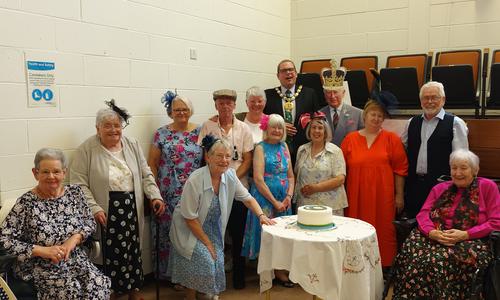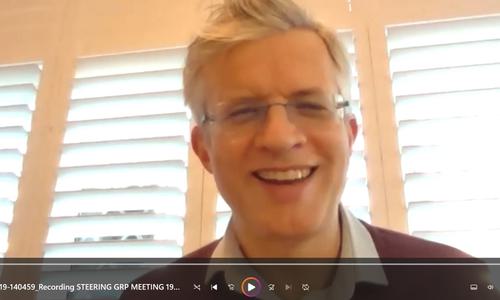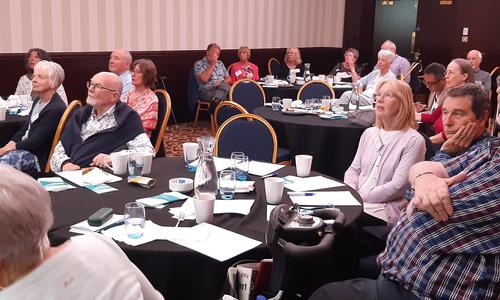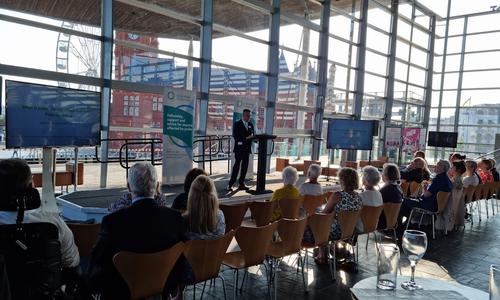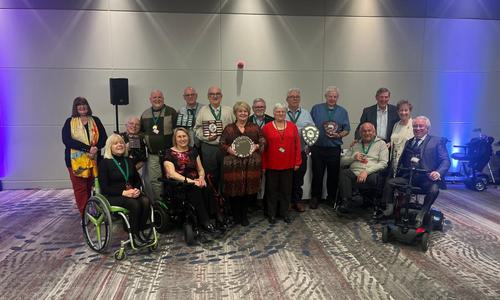World Polio Day: understanding the clinical care needs of polio survivors
NewsRuth Stross, our head of nursing, recently had the pleasure of meeting Kripen Dhrona, CEO of the British Polio Fellowship, through her work with the Neurological Alliance. This meeting sparked meaningful discussions on how to raise awareness of poliomyelitis among healthcare professionals, ultimately aiming to improve care for those affected by the disease. Frances Quinn, a trustee of the British Polio Fellowship, plays a pivotal role in advocating for people living with polio. Drawing from both personal experience and academic expertise, she eloquently highlights the key challenges in this recorded discussion. Additionally, Dr Simon Shaw, lead clinician for the optimal care pathway, emphasises the critical importance of this work in supporting clinicians to better manage polio care.
On World Polio Day, 24th October, we turn our attention to those in the UK who contracted polio when they were younger. Now living with complex, long-term symptoms, these polio survivors face a healthcare system that often lacks understanding of the virus's impact in later life. They also encounter challenges in accessing local and regional neurorehabilitation teams that could offer specialised care, long-term support, and disability management.
Polio is an extremely contagious viral disease that attacks the nervous system, potentially causing complete paralysis within hours. The virus spreads primarily through the faecal-oral route, though it can also be transmitted via contaminated water or food. Once in the body, it multiplies in the intestines. Early symptoms include fever, fatigue, headaches, vomiting, neck stiffness, and limb pain. In severe cases, approximately one in 200 infections results in permanent paralysis, often affecting the legs. Among those who experience paralysis, 5–10% may die if the muscles responsible for breathing are paralyzed.
Polio primarily targets children under the age of five, though unvaccinated individuals of any age remain vulnerable to infection. Currently, there is no cure for polio; prevention through vaccination is the only defence. Two types of vaccines are available: the oral polio vaccine (OPV) and the inactivated polio vaccine (IPV). Both vaccines are proven to be safe and effective, and they are used in different combinations around the world based on regional needs to offer optimal protection against the disease (WHO Poliomyelitis)
No confirmed cases of paralysis from polio contracted in the UK have occurred since 1984. While traces of poliovirus were recently detected in London’s sewage, the risk of infection remains extremely low. However, the risk increases if you are not fully vaccinated, so it’s essential to ensure both you and your child are up to date with vaccinations (nhs.uk/conditions/polio/)
"I think we're a bit of a hidden community. Most people have heard of polio as being somewhere else."
Frances Quinn, trustee, British Polio Fellowship and polio survivor
It is estimated that somewhere around 50,000 polio survivors currently live in the UK, but the true number is likely much higher, possibly in the hundreds of thousands. Due to the age of medical records and the way the virus was documented in the past, it is difficult to provide an accurate count.
What is clear is that most of those who contracted polio during past epidemics are now over 50 years old. Not forgetting a smaller yet growing group of younger individuals who contracted polio abroad before moving to the UK.
For decades, polio survivors have managed their condition largely on their own, using coping strategies developed in the 1950s and 60s, often without access to informed medical care. Many suffer from wide-ranging physical disabilities due to the significant motor neuron damage caused by the original infection. As people age, these disabilities often increase (late effects) or new symptoms arise (post-polio syndrome, PPS).
"Post-polio syndrome is not always accepted as a diagnosis, but remember, it’s a clinical diagnosis. It’s not something you find on a nerve conduction study. More than 50% of this cohort suffer from functional deterioration that can occur 15 to 20 years or more after the initial infection."
Dr Simon Shaw, clinical director, National Spinal Injuries Centre at Stoke Mandeville Hospital and consultant in rehabilitation medicine
The psychological impact of the initial polio infection and its treatment has largely gone unaddressed. Survivors endured traumatic experiences such as prolonged isolation, physical restrictions in casts and splints, separation from family, and challenging, often painful rehabilitation. These experiences have made it difficult for many to talk about their condition, feelings, and concerns.
Healthcare for polio survivors has been hindered by a general lack of awareness and understanding among health professionals, including those in primary care, about polio and its long-term effects (e.g., Late Effects of Polio (LEOP) and PPS). Survivors often face misdiagnosis, incorrect assumptions that weak or atrophied muscles can be strengthened through exercise, a failure to recognize early PPS symptoms like difficulty breathing or swallowing, inadequate orthotic and footwear provisions, poor pain management, and inappropriate surgical referrals.
The aftereffects of polio are complex and require specialised care and management, yet most experienced doctors in this field have retired.
"We need to make sure that the healthcare professionals involved in their care really understand the lifelong nature of the effects of polio. It’s not just a one-time illness; it continues to impact people in many ways throughout their lives."
Frances Quinn
"One thing that often gets overlooked is the mental health aspect and looking at people holistically."
Kripen Dhrona, CEO, British Polio Fellowship
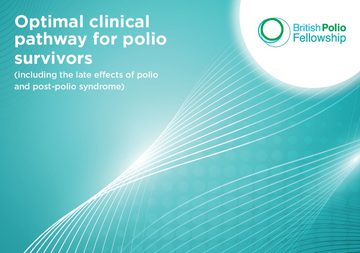
To address these challenges, the British Polio Fellowship has developed and launched an optimal clinical pathway for polio survivors (including LEOP and PPS). This pathway outlines a clear referral process to ensure that polio survivors experiencing new or worsening symptoms receive specialist assessment, diagnosis, and treatment promptly to prevent further, avoidable functional decline and disability.
The pathway has received approval and endorsement from leading healthcare professional organisations, including The Association of British Neurologists (ABN), The Royal College of General Practitioners (RCGP), The British Society of Physical and Rehabilitation Medicine (BSPRM), The Royal College of Nursing (RCN), The British Association of Prosthetists and Orthotists (BAPO), and the Neurological Alliances across all four nations.
"Any person needs a holistic assessment of anything that might have been affected by polio. So, their sleep, their breathing, their walking, their aids, and the social care support. In our pathway, we have listed the type of clinicians and healthcare professionals that are needed. It's a very long list: speech and language therapy, respiratory therapy, psychological therapy, and vocational occupational therapy, because people are still working."
Frances Quinn
The British Polio Fellowship, a charity dedicated to supporting polio survivors in the UK, is calling on healthcare professionals nationwide to use the pathway and ensure that polio survivors receive consistent and effective care, which is essential for maintaining a good quality of life.
The BPF are also establishing a peer support network for healthcare professionals. If you are interested in joining the network, please feel free to contact them by email info@britishpolio.org.uk.
Useful links:
- Optimal clinical pathway for polio survivors: https://www.britishpolio.org.uk/optimal-clinical-pathway
- Polio survivor clinical experiences: https://vimeo.com/987059637/edcd82ba70
- How lives were affected by polio: https://www.britishpolio.org.uk/stories
- The British Polio Fellowship: https://www.britishpolio.org.uk/about-bpf-1
- BPF’s purpose: https://www.britishpolio.org.uk/about-us
- Benefits of BPF membership: https://www.britishpolio.org.uk/membership
- NEWS Charity sets out an optimal pathway for polio survivors: www.britishpolio.org.uk/post/charity-sets-out-an-optimal-pathway-for-polio-survivors
- RCGP PPS training module: elearning.rcgp.org.uk/course/info.php?id=249
- BPF guides for healthcare professionals: www.britishpolio.org.uk/guides-hc-professionals
- BPF factsheets: britishpolio.org.uk/factsheets
Related articles
Uniquely practical education, producing specialist clinical leaders transforming local healthcare
Neurology Academy is an innovative educational provider for healthcare professionals including consultants, specialist nurses, pharmacists, therapists and other allied health professionals. Our courses are developed by practicing specialists who combine their experience and expertise into case-based learning designed to create specialists in their field with confidence in effecting change.
